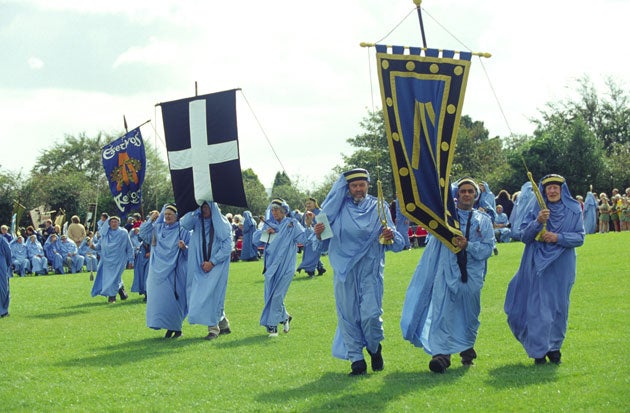The Cornish: They revolted in 1497, now they're at it again
As Cornwall's culture undergoes a renaissance, activists want the population census of 2011 to specify Cornish as a distinct nationality

What's black and white, and plastered all over the back windows of cars and vans in Cornwall, hangs from the county's roofs, and is even printed on the back of Cornish pasty packets?
It's the St Piran's flag – the white cross on a black background that symbolises the fierce independent spirit of the Cornish – a spirit that is increasingly asserting itself in the most south-westerly corner of England.
Not since the Cornish rebellion of 1497, when of thousands of Cornishmen marched on London, have calls for autonomy been so strident. Now a campaign has been launched to have Cornish offered as a nationality option in the 2011 census.
MPs and councillors are among those who are appealing to the Office of National Statistics (ONS) to offer a distinct Cornish category on census forms. The ONS is resisting, saying that people free to declare themselves Cornish on forms, as they did in 2001, but campaigners insist that without an explicit option the census will fail to record the true number of people who consider themselves Cornish. More than 3,000 people have joined a group on Facebook calling for a Cornish tick box.
The campaign ignited after it was discovered that more than 37,000 people recorded their nationality as Cornish after ticking "other" in the 2001 census. It follows a private member's Bill in July which called for Cornwall to be treated like Scotland and Wales and have its own government.
Mebyon Kernow, the Cornish self-governance party, won three seats in the county's council elections in June – three more than Labour and UKIP. MK also won 7 per cent of the Cornish vote in the European elections, and there will also be a candidate from the party in all Cornish constituencies at the next general election.
"Cornish identity is experiencing a renaissance," said Dan Rogerson, MP for North Cornwall, who sponsored the Bill. "If a separate assembly works in Wales why couldn't it work in Cornwall? We've got half a million people and a very distinct identity and history." His Bill calls for greater control over education, housing, agriculture, heritage and economic sustainability.
Dick Cole, the MK leader and a Newquay councillor, said: "We exist in order to campaign for self-government for Cornwall, so we wouldn't be getting these levels of support if it wasn't an increasingly popular idea. The census is an opportunity for us to put pressure on central government and the ONS to acknowledge that we are separate."
The sense of separation was prominent yesterday as hundreds of people gathered in Saltash for the Gorseth Kernow, a traditional event celebrating Cornish culture, similar to the Welsh Gorsedd. The event's archaic traditions suggest it has been happening for centuries. However, the first was held in 1928.
Despite this it has gained a strong following in recent years. Vanessa Beeman, Grand Bard of the Gorseth Kernow, says: "There is definitely a surge of interest in protecting what it is to be Cornish. I'm Cornish first and British second. If you see maps of Henry VIII's time he talked about Scotland, Wales, Cornwall and England. We got absorbed into England but nobody ever discussed it; we're still a separate duchy."
Such efforts have been encouraged by Europe's recognition of Cornish as a minority language in 2002, which brought in new funding for cultural projects. Fifty primary schools in the county now teach the Cornish language. Jenefer Lowe, of the Cornish Language Partnership and a member of Hevva, a Cornish music and dancing group, says she has noticed a renewed enthusiasm for asserting the county's separate identity.
"Cornish culture has very much come to the fore in the last few years. I think it's a reaction to globalisation and people realise that cultures such as ours are very vulnerable. Twenty years ago there was one traditional Cornish dance group; now there are six display groups working all the time." Traditional sports such as Cornish wrestling have also grown in popularity.
The growing awareness of Cornish identity has certainly boosted sales of the flag. Alan Baker, who runs Cornish Flags, says orders have gone through the roof. "In the last couple of years we've doubled our turnover each year. People are more proud than ever to show that they're Cornish."
Subscribe to Independent Premium to bookmark this article
Want to bookmark your favourite articles and stories to read or reference later? Start your Independent Premium subscription today.

Join our commenting forum
Join thought-provoking conversations, follow other Independent readers and see their replies